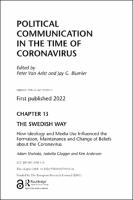Chapter 13 The Swedish way
Proposal review
How Ideology and Media Use Influenced the Formation, Maintenance and Change of Beliefs about the Coronavirus
Author(s)
Shehata, Adam
Glogger, Isabella
Andersen, Kim
Collection
European Research Council (ERC)Language
EnglishAbstract
This chapter examines public belief formation in Sweden during the first six months of the COVID-19 pandemic. Based on theories of sociotropic belief formation, we analyze how citizens’ ideology, personal experience, interpersonal talk and media use influence their beliefs about how the coronavirus affects the Swedish society. The findings from analyses of three waves of panel survey data suggest that (1) citizens continuously update their corona beliefs over time; that (2) ideological belief gaps emerge in the initial phase of the crisis but remain relatively constant over time; that (3) corona beliefs primarily depend on ideology and news media use; and that (4) these two factors also influence the likelihood that citizens hold-on to beliefs formed at an early stage of the pandemic. Furthermore, while news media use was more clearly related to perceptions about the magnitude of the coronavirus as a societal problem, ideology played a larger role for perceptions about how Sweden had managed the virus.
Keywords
Covid-19, beliefs, public communication, Sweden, ideology, citizens, news media, media use, pandemic, coronavirusDOI
10.4324/9781003170051-16ISBN
9780367771577, 9780367761851, 9781003170051Publisher
Taylor & FrancisPublisher website
https://taylorandfrancis.com/Publication date and place
2021Grantor
Imprint
RoutledgeClassification
News media and journalism
Political structure and processes
Media studies


 Download
Download